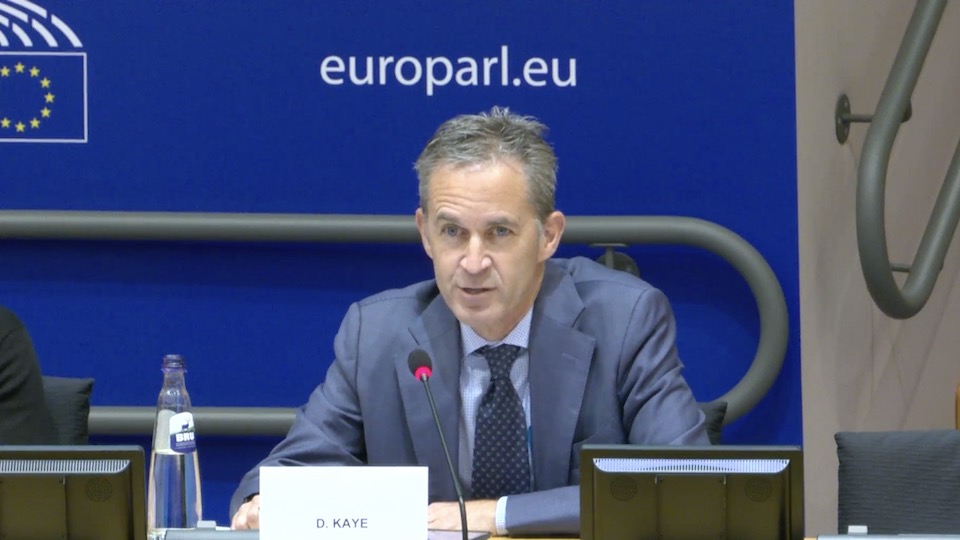Former UN Special Rapporteur calls for ban on spyware

Former UN Special Rapporteur David Kaye calls for a ban on spyware. In an appearance before the Pegasus Inquiry Committee in the EU Parliament, Kaye said he had serious doubts that these technologies could ever meet the requirements of international human rights treaties.
Kaye was the UN Special Rapporteur on Freedom of Expression from 2014 to 2020 and has already dealt with spyware in that capacity. Last week, he was heard as an expert by the European Parliament’s Pegasus Inquiry Committee.
There, he warned that surveillance technologies like Pegasus allow attackers to spy on people’s entire digital lives. This could include victims’ communications as well as their contacts, location data and browsing habits. Spyware does not distinguish between legitimate and illegitimate surveillance targets.
Threat to fundamental rights
According to Kaye, the use of spyware poses major risks to fundamental rights and urgent global action is needed. People would doubt the confidentiality of their communications due to surveillance and could therefore withdraw from private debates and public discourse. In democratic societies, this is particularly fatal when it comes to media professionals, human rights activists or politicians.
Moreover, he said, people with whom spy targets are in contact, such as journalistic sources, are also affected. Kaye also warned that a chilling effect could arise: people could also practice self-censorship if they do not know whether they themselves are being monitored – for example because they belong to a group such as human rights activists that is being spied on by certain governments.
What is Pegasus?
Pegasus is a spy software from the Israeli company NSO Group. The spying software can completely take over an infiltrated device and, for example, turn on the camera and microphone without being noticed or copy all data. Location data can also be retrieved and passwords read out. The surveillance program has been criticized for years in connection with human rights violations.
Furthermore, spyware not only interferes with the rights to privacy and freedom of expression, but can also violate the right to freedom of assembly, for example. Its use could also lead to serious violations of, for example, the prohibition of torture or the right to due process of law.
Because of the serious threat to fundamental rights posed by spyware, states would have to explicitly prove that such interference is justified. Governments and the providers of surveillance software would usually argue with the threat to national security and action against terrorism. Kaye criticized states and surveillance software vendors for hiding behind state secrets, contractual agreements “and other excuses” instead of proving why the use of spyware is necessary. Because no evidence is presented, spying software must be presumed to violate “several important principles of international human rights law,” he said. For example, to restrict the right to privacy, a general reference to national security is not sufficient, he said. Moreover, the UN Guiding Principles on Business and Human Rights also obligate providers of spyware to prevent or mitigate human rights violations through their activities, he said.
Moratorium as “minimum”
Kaye said he has serious doubts that surveillance technologies with the capabilities of Pegasus can ever meet the requirements of international human rights treaties. Their use should therefore be considered unlawful. He therefore urged the committee to consider a ban on the use and export of such surveillance technologies.
At a minimum, however, there must be a worldwide moratorium on the development, marketing, sale, transfer, and use of such spyware. This would have to apply until, for example, international export controls and supervision of the use of Trojans are ensured.
Kaye had already called for such a moratorium in 2019 in his role as UN Special Rapporteur. He had warned at the time that surveillance of individuals was leading to arbitrary arrests, torture and possibly killings.
Last year, several UN human rights experts, including Kaye’s successor Irene Khan, also called for such a moratorium (in German). They warned of a threat to democracy and called surveillance technologies “life-threatening.”
Organizations such as Reporters Without Borders and Amnesty International have also been calling for a moratorium for some time. Last Friday, the human rights organization delivered a petition to the United Nations General Assembly calling on the international community to establish a global moratorium on the use and trade of surveillance technologies.
Markus N. Beeko, Secretary General of Amnesty International in Germany, said: “Binding, human rights-based safeguards for the export and use of surveillance technology are finally needed. UN member states must no longer use or accept spyware as a tool of oppression. Until that happens, there needs to be an immediate global moratorium on the export of spyware.”
European Data Protection Supervisor also calls for ban
In mid-February, the European Data Protection Supervisor, Wojciech Wiewiórowski, also called for a ban on spyware with the capabilities of Pegasus in the EU. Such programs threatened people’s fundamental rights and freedoms, as well as democracy and the rule of law. Their use was therefore incompatible with the democratic values of the EU.
The EU Parliament’s Pegasus inquiry committee was set up in spring to investigate whether EU member states have violated Union law by using spyware – for example, against the European Charter of Fundamental Rights or Data Protection.
The creation of the committee was triggered by reports that EU governments had also illegally used spying software. Journalists were spied on in Hungary, for example, and opposition figures were spied on in Poland (in German). Politicians in Spain (in German) were also monitored. Most recently, it was revealed that a journalist in Greece was also monitored with spyware (in German) and the cell phone of an opposition politician was targeted.
The members of the committee also visit the affected countries to talk to politicians and those affected. However, the work is sometimes difficult. In September, for example, representatives of the Polish Ministry of the Interior and the Ministry of Justice refused to meet with the committee members. (js)